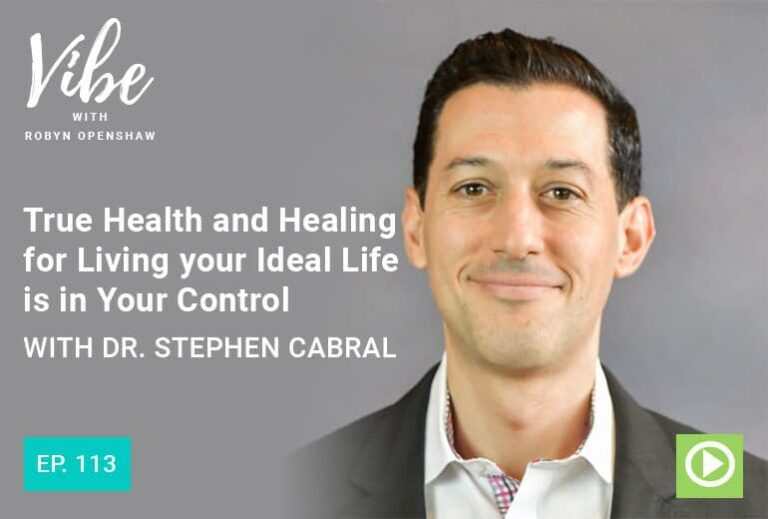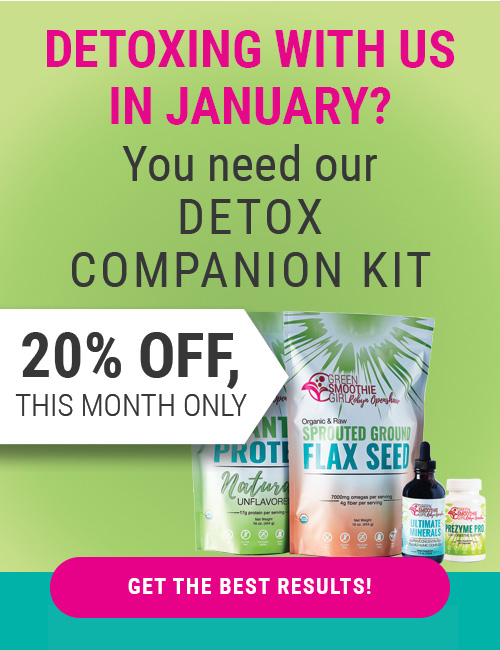Ep. 113: True Health and Healing for Living your Ideal Life is in Your Control Interview with Dr. Stephen Cabral

Podcast: Play in new window
Today we are speaking with Dr. Stephen Cabral, a Naturopath, Ayurvedic and Functional Medicine Practitioner. At the age of 17 he was very ill with multiple severe health issues. He saw over 50 different doctors, tried over 100 different treatment protocols and saw no hope of recovery. He then met an “alternative” health doctor whom explained to him how he could become well again. And that is how he began his own recovery process into true health and wellness and knew his life would be dedicated to helping others rebalance their bodies and renew their health.
Dr. Cabral has spent over 5,000 hours of formal doctoral degree work, which included 2,200 hours of internships. These internships were mainly spent overseas studying the very best of natural medicine (much of which is unknown here in the US). Having experienced first hand what it’s like to have changed from a state of chronic sickness, pain, weight gain, depression and suffering to now living a life full of energy, vitality and happiness, he has made it his mission to help others feel and experience the same transformation in body, health and happiness.
“You can be, do, learn, and have anything you want in life – it’s just up to you to take that first step,” says Dr. Stephen Cabral. And through his practice and clinics and lab testing and more, including his book “The Rain Barrel Effect” he shows you the way to take back control of your life.
LINKS AND RESOURCES:
Get Dr. Cabral’s book “The Rain Barrel Effect”
Connect with and Learn more about Dr. Stephen Cabral
Check out his products and Personal At Home Lab Testing
TRANSCRIPT:
Robyn:
Hey everyone. It’s Robyn Openshaw and Welcome back to the Vibe show. Today I am interviewing someone who, multiple of our listeners have asked me to interview. His name is Dr. Stephen Cabral. He is a board certified naturopathic doctor and he’s founder of a clinic in Boston called the Cabral Wellness Institute. One of the most interesting things to me about Steve’s story is when he was 17, he was diagnosed with a life altering illness and he was given no hope for recovery. So I kind of get into that in the, in this episode asking him how he ended up a naturopathic doctor.
Because doesn’t it always seem that it’s because, uh, almost every naturopathic physician I know was, was very ill as a child, and after going to allopathic physician after allopathic physician, uh, they finally find some relief with someone in the naturopathic world, someone in the holistic medicine world. And definitely true of this physician because he was suffering for years and years and years and years on constant antibiotics. And so he’s a great student of Ayurveda healing practices as well as sort of modern state of the art naturopathic and functional medicine practices. And uh, it’s exciting to hear how healthy he is today.
So Dr. Stephen Cabral. Thanks for being on the Vibe show today. Welcome.
Dr. Cabral:
Oh, it’s a pleasure. Thank you for having me.
Robyn:
So I know that you were really sick as a child and if I’ve heard one thing over and over again with the many functional medicine practitioners we’ve had on the show, their own health journeys have led them to seek out natural medicine. Tell me a little bit about how you got into it. Did that have something to do with it?
Dr. Cabral:
Yes, without a doubt. I mean, growing up in, right outside of Boston, in Medford, Massachusetts, there was really no such thing as natropathic medicine or Aruyvedic medicine, traditional Chinese medicine. All we did was go to our typical pediatrician and dermatologist. And you know, the typical American Medical Association doctor. And there’s nothing wrong with that. We’re very lucky to have MD’s that can help us in lifesaving based situations. But the problem was that I was taking antibiotics three, four, six times a year. And then at about 14 years old, I was put on Amoxicillin twice daily for three years. So I ended up swallowing about 3000 capsules of antibiotics by the time I was 17 where my health took a real nosedive. And um, I got extremely sick.
Robyn:
Oh my goodness. So what started it? What was your illness that you had when you were a kid? And why would you end up on three years of Amoxicillin?
Dr. Cabral:
Well, so that’s the harmful part is that I went on, you know, I had sinus issues, I had upper respiratory issues all the time. Sinus infections, pneumonia, bronchitis. But I was also eating a lot of foods that were incompatible with my body. So I was eating a lot of dairy, drinking milk with every meal. All of these things that now we’re looking back and saying, okay, that doesn’t make a lot of sense. But 20 plus years ago, this was just standard, especially where I grew up.
So what happened was when I was 14, I had a lot of acne based issues and again, these weren’t major, but there were enough. And so I went to the dermatologist and they put me on antibiotics because even today antibiotics are still used prolifically for skin based issues. And we know that it helps eliminate a lot of the bacteria in the blood and body, but the problem is that that bacteria in your gut, the good bacteria, ends up getting wiped out along with it. And with that, your Serotonin, your ability to process B vitamins and basically your feel good serotonin and immune system as well. So that led to a real downward spiral that again, conventional medicine had no answers for at 17.
Robyn:
And so did you end up being a naturopathic physician because that’s where you finally found answers? How did you dig your way out of three years of wrecking your gut with antibiotics?
Dr. Cabral:
So my body crashed when I was 17 and essentially my immune system began to shut down. So much so that I ended up with Type two Diabetes. Rheumatoid arthritis, Addison’s disease, fibromyalgia, Myalgic encephalomyelitis, and a bunch of other fun, you know, medical names that we throw around. So I had no immune system left. I couldn’t regulate my adrenals and cortisol and I couldn’t regulate blood sugar. And I had autoimmune based processes attacking my joints. Well, the only way out of this that conventional medicine could find, and I’m talking the best specialist in the world here in Boston, Massachusetts and again, very brilliant minds. But if you’re only taught to use biological drugs and to start to shut down other parts of the immune system, that’s all you know to do.
And I knew that based on my current reading and this was in the late nineties, so when I’m talking about that I’m saying no internet, at least not for me, is reading a lot of books and realizing that there was no way out of this, that most likely I was going to die of premature death because of Addison’s disease. And because of a lot of these issues that I was having. So it wasn’t good enough for me. I didn’t know how to get out of it. But eventually, two years later, so it took quite a long time, suffering with this, I was just starting to make my way into functional medicine and meeting practitioners 20 years ago that had an understanding of what’s called subclinical lab testing to actually look at what my deficiencies were. What was going on at a foundational level and that just piqued my interest and moved me away from, you know, my lost childhood of not knowing what I was going to do with my life, to really moving into functional medicine and naturopathic medicine.
Robyn:
You’ve named a lot of the diagnoses that our listeners have been diagnosed with and these are, these are diseases if you want to call them that, or states that, um, that standard of care medicine doesn’t have very many answers for. And if they do, it’s certainly not addressing it at the foundation of it, at the root cause. How, how are you today? How are things today? Have you turned all of those around? Have you been able to rebuild your gut? I bet you have some hopeful words for people who are wanting to turn it around major disease states.
Dr. Cabral:
Without a doubt, and that’s why I tell people that you have to not associate with your dis-ease itself. You know disease is a dis-ease of the body and the only reason you have that truly is because there is some type of deficiency that your body is missing or you have some type of toxicity that has too much of. And I know that seems overly simplistic, but the truth is that our bodies are meant to heal and meant to be healthy, but only if they’re given the right raw material and we help them to remove whatever it’s going after.
All of the symptoms that we suffer from. Everything that I just spoke about was a very simple, a bio mechanical process that happened in my body. Meaning that when I was overly stressed from, I had Candida. I had SIBO, than I had h-pylori. I didn’t have parasites, but I had three out of the four. And so that was a stressor in my body, and then that led to a lot of intestinal permeability. My gut wall was spilling proteins and bacteria into the bloodstream, which again turned on my immune system to a greater degree that created an inflammation. Today we’re trying to treat inflammation, but inflammation is not a disease. It’s not even a root cause based issue. It’s a symptom of a greater issue.
So what I’ve realized over those years, it took me 10 years. Now I can tell you that most people can get well within about 12 to 16 weeks. For those people with strong autoimmune issues, we’re talking somewhere around six months. I mean, that’s because there’s a deeper level of healing. It took me 10 years because I didn’t have any of this information. None of this was available to me. I went overseas and studied much of it in, uh again, don’t get me wrong, the United States is amazing, so I studied a lot in the United States.
But my internships, I specifically went over to India, studied Ayurvedic medicine in Sri Lanka. I went to China, I studied, I was an intern to all of these places in hospitals such as a traditional Chinese medicine hospital. And what I realized was that there’s a healing process for everyone, but unless you understand what’s going on inside the body, it’s difficult to repair those mechanisms. But to answer your question, not as long winded, today, not only am I completely dis-ease free, I feel better than I did at 14 years old, 16 years old, when I was supposed to be in peak health, now 20 plus years later, every year, feeling better and better.
Robyn:
That’s wonderful. I think that’d be really helpful for people who are suffering from fibromyalgia and Gosh, you mentioned Addison’s disease, I mean if that doesn’t get diagnosed, people can die of that. You had quite the list as long as your arm of diagnoses. How do you put together Western and Eastern forms of medicine? What do you have to say about it now that you not only have turned around your own health issues but also probably treated lots of patients? I know that your clinic has done 250,000 patient appointments. Yeah?
Dr. Cabral:
That’s correct. Yes. And probably 90 percent of our practice right now over the last three years has really moved to virtual, where we help people all over the world. Because that’s the nice thing about where I believe this health industry is moving and that’s, the content, the information is available. It’s really out there. What we need to do is put it into a system that works, meaning that, you know, we, I know that you’re a believer, I’m a believer in that the majority of our diet should be produce based. You know, it should be low glycemic fruits and berries and it should be a lot of vegetables and high antioxidant based foods. I mean, I did a show just like this, you know the only proven anti-cancer based diet is one that’s loaded with anti-cancer based foods.
So all of this is great information, but what happens is, when someone does have rheumatoid arthritis or Type two diabetes or many of these things, it goes deeper than that. And that’s because, and that’s why I’m a big believer in smoothies as well. We need to create such easily digestible foods that we can super saturate the body with the vitamins, minerals, amino acids, etc. that it needs. Because when you get very sick, your body shifts and it shifts in a way that doesn’t allow for robust digestion. Typically we go lower stomach acid, we’re then producing less bile so we can’t remove the toxins as well from our gut. So what we recommend is a deeper foundational approach and if possible, you know, really doing some at home functional medicine lab testing with either a local functional medicine or naturopathic doctor, um, or doing that through an online based process as well.
Robyn:
Okay. So now we know that if someone wants to be your patient, they can do that, uh, through Skype. And I’m seeing a lot more of that. So many of the functional medicine doctors that we have interviewed have gone to like telemedicine platforms. So that’s pretty great because that means someone from somewhere else in the US, besides Boston, where you are, can get help just on Skype and doing some lab tests at home. We’ll get into what kind of lab tests you want a patient to look at which ones you think are really critical,. But the reason I wanted you to come on the show, when one person tells me you should interview this person, then you know, I kind of make a mental note of it, but it was actually multiple people who wanted me to interview you about the Rain Barrel Effect and I know that earlier this year you came out with a book with that exact title. Tell us about the concept of the rain barrel effect.
Dr. Cabral:
So to me the rain barrel effect, it’s not something that I made up or I created, what I’m trying to do is just bring it into the common vernacular. So it’s a term that we need to know. And it’s because it helps you understand why you’ve become more anxious in life or feeling overwhelmed or you’ve gotten sick or you’ve gained the weight very slowly and you can’t seem to ever take it off. And that’s because if you look at the visual of a rain barrel, essentially it’s a barrel on the side of a house that collects the water from gutters, that kind of drains off the house. Well, nobody’s ever watching that level in the rain barrel. It begins to start to flow and grow and grow. And then eventually it overflows and it spills out everywhere.
Well, it’s the perfect analogy for why we have allergies in the spring, right? They’re always kind of under the surface, but then the trees bloom and then there’s pollen in the air and we react to that. Or you know, we get the puffy eyes and swelling when we go out and we have a little bit of alcohol because the liver is become more and more congested each year. So what happens is that really you can begin to look at someone by just looking at the symptoms of where someone is, how close they are to a diseased based state.
So we call it a disease. When someone has rheumatoid arthritis or again fibromyalgia, we work with a lot of people with Hashimoto’s or estrogen dominance. But the problem is that all of those things have been growing most likely for years and eventually you reach the top of your rain barrel, it overflows and then you get the diagnosis and then it shows up in your blood work. But had you done some clinical labs or had you just been more self-aware, if someone kind of taught you like they didn’t teach me of all these things beginning to present themselves.
The bloating or the fatigue after lunch is that they’re starting. They’re beginning to grow and unless you begin to empty that rain barrel, removing your food sensitivities or your toxicities or higher levels of estrogen, lower levels of progesterone, it will one day begin to tip. And that’s when you see the first symptoms of dis-ease. Which is really, again, not a disease, but your body in its wisdom trying to right the ship, whether that’s going after bacteria in the body or creating inflammation. Those are reactionary based events of your body actually believe it or not, trying to help.
Robyn:
Interesting. So I’ve probably had half a dozen functional medicine practitioners on the show refer to some other but very similar kind of metaphor and in fact I’ve sort of picked it up and started to refer to it as the bucket. You know, and you’ve got lots of, and I think what you’re saying, is like toxicity and garbage that the body has to deal with as a metaphor, lots of garbage going in the top, nothing draining out the bottom. And so, I think what you’re saying is your approach to medicine is to help people not have so much going in the top of the rain barrel and get it draining out the bottom so it doesn’t get full and tip over. Is that it?
Dr. Cabral:
It’s well without a doubt, that we live in a society for the most part, especially the people listening to this podcast, that there’s not a want or a need for anything, meaning like there’s 100 supplements we could use. There’s 100 super foods. There’s so much of everything. And we’re now talking about fasting as it’s innovative, and like we want to actually not put more food in our body. So for me that before we begin to really absorb more, take in more, rebuild the body. A lot of times we need to empty that cup. So that we can put the good back in.
So I’m a huge believer in what’s called ramping up, what’s called phase one and phase two liver detoxification. And removing a lot of the, I call them the 10 toxic overloads for our body. And that’s, I won’t go through all of them, but it’s heavy metals, it’s intestinal permeability and all the bacteria that comes out and food sensitivities. So it’s removing all those things from our life but also from our body. So we can start fresh. And then everything you put in after that becomes absorbed to a much greater degree. Because if your digestion and your liver aren’t working well, really hard to eliminate and absorb everything that you do need.
Robyn:
You mentioned fasting. Let’s go sideways for a minute on that. It’s really trending because of the trendy diet, the Ketogenic diet has sort of popularized this idea of intermittent fasting, which I’ve said before on the show kind of makes me laugh because when you ask somebody what intermittent fasting is all it means is not eating from dinner until breakfast. And I’m like, isn’t that what we’ve pretty much always done since the dawn of time? And not just like, I think that people are going to feel better on the Ketogenic diet or any time you employ this, this intermittent fasting thing. Just if you stop eating potato chips or half a bottle of wine or whatever it is, you’re eating late at night or even healthy food, you know, just stop eating and let your body do it’s, you know, rebuilding work through the night.
And so it was just kind of funny because it’s 12 or 14 or even 16 hours of not eating, which to me is not fasting at all. It’s just not eating from dinner until breakfast. But talk about fasting a little bit because I’ve done an entire episode on my own fasting adventures. I fast for a week or two weeks at a time, quite a few times in my life. What are your thoughts about the whole fasting fad? You’re right, people have been doing it for thousands of years and all of a sudden now it’s trendy. What? What’s the deal was fasting?
Dr. Cabral:
Yeah, so fasting, I believe it’s the closest thing we have to the fountain of youth. I truly believe that. And that’s because a process called autophagy begins to take place. Where again, as a naturopathic doctor, as any health practitioner, your job is not to heal the person across from you that you’re caring for in your practice. Your job is to put their body in the position and mind, in the position to heal.
So what we’re trying to do is empty the rain barrel through fasting and that’s why, we were always, again, if we didn’t have all this modern electricity and all these great things, we would stop eating and go to bed when it was dark and we would wake up when it’s light. And that’s going to be about 12 hours during the winter, maybe a little bit more and a little bit less during the summer. That’s normal. That actually would work with our proper digestive organs, meaning that there is no food in the stomach going to bed and allows them for better detoxification throughout the night and repair.
But the bigger thing, is that, and we’re also talking about forms of fasting like everyone in my opinion, there’s always a contraindication for one percent of population. Again, so if you’re a hypoglycemic, you have Addison’s like I did, you can’t regulate blood sugar. You might want a little snack before bed. And again we can talk about that, but that’s a small percent of the population. Most people 12 hours a day. And then once a week you might do a 24 hour fast, which is from let’s say Sunday night after a larger week of eating or something like that til Monday night. So you can see you can still eat daily, but that’s a 24 hour. Then once a month you might do 24, 48 hours. You might do a little bit more, or maybe you do two to three days, every 12 weeks. We do a seasonal functional medicine detox. And once a year you might do an even longer one.
So there are ways to fast. The problem is that Keto is different than fasting. I’m not an advocate of a Keto based diet. We’ll do some cyclical base, meaning like two or three weeks maximum for those people with Type two diabetes or those with blood sugar dysregulation, et cetera. But since I do so much lab testing, I can tell you right now, guys typically do pretty well, but women after about three to four weeks on a Keto based diet, if we run their adrenal thyroid based panel, and again you can do this right at home, you will see elevated levels of cortisol, lower levels of progesterone, estrogen dominance, estrogen stays normal, but again, progesterone is lower, which means that’s called estrogen dominance.
They’ll start to feel the effects of that lower mood, harder to lose weight, water retention, cellulite, and then thyroid begins to increase, meaning TSH begins to increase and absorption or T3 starts to go down, which means because of the survival stress-based situation, they put themselves in, hence no carbs, you’re missing a whole macro. You can’t produce the level of anti -cortisol or serotonin. You begin to suffer the effects of that. So that’s something I can tell you from a clinical perspective, not holding up. And I believe it’s a biological base, especially biological based reason especially in women, that’s to allow them, if they’re in that type of stressful situation, to not be able to bring a child or life into this world.
Robyn:
Yeah. It’s funny that you kind of went off on a side thing about how you feel about the Ketogenic diet. It’s too bad I didn’t interview you before I ran a blog post, um, last month, which is 22 health experts debunk the Ketogenic diet. And I’ve been talking to my audience about how ridiculous I think this fad is, how harmful it is, how it’s just bringing back the Adkins diet, which got run off the stage by lots and lots and lots of scientific evidence showing that it’s a terrible idea to eat that much fat and to band carbohydrates.
So you know, you’re singing the same song I am. I did just want to note to my audience who may think that I’m obsessed with single handedly running the Ketogenic diet off the stage. Yeah. I didn’t even ask Dr. Cabral for his opinion on that. I would just like to note that. But um, what did, what did you eat? What was your diet like in, in your healing process? Because you were very, very ill and I was very inspired to hear that you feel better than you ever have and that these disease states are all in your rear view mirror. How do you eat?
Dr. Cabral:
I can just say that I made every mistake possible. So when people tell me and I see them in the process, I understand the process they’re going through because it’s a journey we’re all on. And that’s the thing is that I used to be upset that at, you know, I was that sick and I missed a lot of my late teenage and early 20 years, like prime of my life. But if I had not gone through that, and I also say that if I got well in six months, well I wouldn’t know what I know now. Because it was an exploratory journey that I was on, where finally I met my mentor at 27 years old, who combined the best of Ayurvedic, functional medicine, lab testing, ortho molecular genetics to just pull everything together. And so that then transformed the way that I did things because I was eating also too much protein because I was still into, I figured that if I’m not feeling well inside, I can still transform the outside of my body.
And I’ll never deny that eating vegetables and protein is going to help you stay lean right? But the problem was that that is not the best thing to do, a high protein diet in terms of overall health. And I had a lot of inflammation, pneumonia, my immune system wasn’t that great, all those things. So now, and again I am completely disease free. All of my sub clinical labs, all of my blood work is perfect. And again, I’ve worked hard to get it that way. But right now I’m such a big believer, and again I have now 300,000 appointments of just data, so we’re running a very big study on our end.
Is that, those people, that they get the majority of their diet from produce, meaning vegetables and fruit. And it doesn’t have to go overboard on fruit if you’re someone that is more prone to blood sugar dysregulation. But one or two cups of berries a day is a must in my book, once you’ve re-regulated your blood sugar. Because the antioxidant potential of those foods is what helps you stay well. So we’re doing two cups or so of fruit and vegetables with three meals per day. I let everyone else argue after that about what type of protein to include in fat. But we’re, we’re doing mainly plant based.
Robyn:
Yeah. I’m glad to hear you say that because, um, I got my health back with a list of 21 chronic health issues in my twenties. I got my health back with a plant based diet. And that’s what we teach around here. Not that we think that you have to be a vegan to be healthy. I’m fond of saying is there’s plenty of people who are eating a little bit of animal protein who are healthy. I was just talking this weekend with a good friend of mine who was in stage three renal failure and was just crashing and burning, um, probably because he was exposed to a lot of agent orange in the war in Afghanistan many years ago or Desert Storm actually when he was young and his functional medicine practitioner put him on a completely plant based diet, very low protein. Um, and it’s not popular.
I’m glad to hear you say this. I didn’t coach you or coax you to say a specific thing about your diet. I was legitimately curious, what you did to heal. Um, two of my colleagues have come out with books in the last year and a half that have said, and I quote, “I don’t know anybody who’s healed of thyroid disease who has eaten a plant based diet” or I think they said vegan diet. And I’ve reached out to both of them to say, yes you do. Yes, you do know of someone. And, uh, I said it’s me. And I know lots and lots of other people who have healed of that. And my own Hashimoto’s has been in remission now for 17 years, continuing to eat a plant based diet.
And so yeah, I’m with you, I’m not really interested in the argument over what exact ratio of fats and you know whether you can eat a little bit of animal protein or not, but I think it’s really clear that it’s either a little bit or none of animal protein and to be really careful of the quality, you know, which animal proteins you’re going to eat. I personally haven’t eaten pork or beef in decades and I continue to be well. So…
Dr. Cabral:
Without a doubt. And I believe that there is a little bit of bio individuality that goes into all of this. My only allegiance is to the truth. And I always tell people that. I honestly, to me diet is the food that we’re putting in our body and I have no dog in the race. What I’ve read and what I’ve seen in my research and in my practice says that those people that, again for most of us, like when you get to that level of you’ve just seen it all, a handful of protein, a handful of either fish or meat, meaning like chicken or poultry, is differentiating the majority of healthy diets out there. So if you’re someone who says, I feel better with a handful of fish or meat per day, then great. And for those people say I feel better with more, you know, dahl and ayurveda, mung bean or a chick pea or hummus, then great.
But you know, your plate when you sit down should be, should look two thirds to 75 percent produce, you know, vegetables, two to three cups. And then add some olive oil on top if you would like, or smash up on avocado. You know, plant based fat has been shown, again, you can make an argument if you want for coconut oil, but it’s never going to supersede a mono unsaturated fat such as an avocado or olive oil. The research isn’t going to back that up. Nobody says olive oil is bad, but there are plenty of research that says coconut oil in excess, may be bad. That it may not be processed by some people, may carry a lipid polysaccharides through the gut wall and cause an immune based dysfunction. So again, am I against it? No, but it’s not going to beat the plant based nutrition play.
Robyn:
Yeah, whole foods first. So tell us a little bit about the at home lab tests that you have someone start with when you work with a patient remotely or you know right there in your office. And tell us if you think it’s possible for someone to get well without lab testing. Do you really need that to get a baseline on a lot of different things?
Dr. Cabral:
Yeah, it’s a great question. So you know, the at home lab testing, we always say it’s for people that have been struggling long enough. It’s kind of like you’re sick and tired of being sick and tired. You have to figure it out. Because the alternative is when you begin a health program, you really need to give it 6 to 12 weeks because the body’s not going to just change overnight. The red blood cells turnover every 90 to 120 days. You want that next group of red blood cells to have what’s called a better bi-lipid membrane or better cell membrane to absorb glucose easier. That’s why you’re not going to turn your glucose levels around typically overnight. Now you can bounce them back out because you’re putting less sugar in your body, and all of those things through processed foods, which is great. But you also want different levels of magnesium and zinc and all of those great things, and new mitochondria inside your cells.
So you can begin with a foundational based protocol. I’m a huge believer, I have something what’s called a “De-stress protocol’. And the “De-stress protocol” one of the eight parts is supplements, right? But there’s seven other parts besides supplements that you want to do in order to begin to heal your body. And part of that is to get into a less stressful based routine. So I talk about healthy habits and calming the body down when it’s time for sleep, but also have time for eating so you can work in absorption.
But for the people again, that have just said, you know what, I’ve tried a dozen different diet plans. I’ve tried a dozen different practitioners. Once you do these subclinical lab tests, there’s no more guesswork. You can see exactly what’s going on in your body and what you do is again, you replace the deficiencies. What are you low it? Are you low in copper? Are you low in zinc? Are you low in magnesium? And we begin to replace those.
And at the same time, what are you toxic in? Do you have candida overgrowth? Do you have SIBO? Do you have h-pylori? Do you have parasites? Do you have food sensitivities? Do you have heavy metals? Right? Then we remove those from the body at the same time. That’s why most people, when they fine tune it, can get well in 12 to 16 weeks. And then for those people that aren’t, well, you’ve already gotten one cell turnover, which means that you’re going to be feeling phenomenally better, even if you’re not completely well. Then what we do after that is we get that next 12 to 16 weeks, the cells turnover again, and at the end of the year a person is 97 percent regenerated. That’s the amazing thing. Ninety seven percent. So if you’ve been sick for a long time and I know that you want to get better tomorrow, but the realistic viewpoint is if you can begin to figure out exactly what’s off with your body, you can correct those things and you can have that true health that you want.
Robyn:
Oh, that’s so hopeful and very specific. I appreciate that. So for our listeners who are looking for a good functional medicine practitioner, uh you’re getting more and more options with telemedicine, which is what Dr. Cabral practices. Can you tell everyone where they can learn more about you, and where they can get your book, “The Rain Barrel Effect”?
Dr. Cabral:
Yeah, absolutely, so I like to always provide as much education as I can and I know you’re the same exact way. And then when you feel like you’ve kind of, you’re ready, because you want to be ready. You want to be not just inspired but you say, okay, I’m going to take action. This is it. This is the time I’m going to move forward. And just understanding that there will always be kind of obstacles and ups and downs, but your job is just to continue to move forward on this health journey and you will learn every single new thing that you implement.
So what I do is I have a daily podcast called the “Cabral Concept”. It’s on iTunes, it’s wherever podcasts are. And my book is called “The Rain Barrel Effect”. Those are two good starting points to just essentially learn more about this form of integrative medicine. And then for those people who might be ready just to start with a protocol, a functional medicine detox or a lab, they can actually go to equallibriumnutrition.com and that is basically just allowing people to take back control of their health.
Because one thing I didn’t have when I was younger was the ability to ask a doctor to run the labs that I wanted. They always kind of like shot me down and said, why do you want to run that anyways, why do you need to know those numbers? And I always left there feeling dejected. And so my goal was to try to empower people however they wanted. And so this allows you to choose what you want to do.
Robyn:
And don’t you have a website, stephencabral.com for people who want to work with you as a patient?
Dr. Cabral:
That’s correct. Yes.
Robyn:
And it’s Stephen with a “ph” in Stephen. Yes?
Dr. Cabral:
Correct. And so it’s kind of come in at whatever level you feel comfortable with because I don’t necessarily need to say everyone has to work with me directly. Maybe you want to read the book or you want to listen to podcasts, you want to begin to work things on your own, maybe you order an at home lab that I still read your results, but you speak with one of my health coaches or maybe you apply to the practice. So you know, we’re just trying to stay open to wherever people feel comfortable.
Robyn:
Well, it’s been so interesting to talk to you today. Thank you so very much for being with us. Dr. Stephen Cabral.
Dr. Cabral:
My pleasure. Thank you for having me on.














No comments found, but you can be our first!